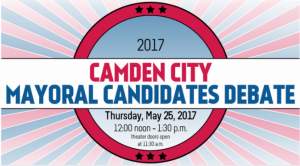***before we get started today, I just want to take a moment to recognize the horror in Manchester yesterday. I loved the city during my time in England. This one hits close to home. For more coverage, here’s the New York Times. And now, back to this week’s Camden mayoral election content***
This Thursday, the Camden mayoral candidates will meet at the Gordon Theater at 12pm for the first (and likely only) mayoral debate. Here’s the eventbrite link to get a ticket.
But the timing — during the middle of the day on a workday — begs a question:
If a debate happens on a weekday, with no one to hear it, does it really happen at all?
There are a host of undemocratic practices in Camden. There’s the long held injustice of a sharply segregated state that takes voting rights away from residents in the poorest and most vulnerable communities. There is the archaic use of the “line” on the ballot. There is an NJ Democratic Party often more worried about the North/South power struggle than promoting good liberal policy. There are the usual hijinks — the promotion of “ghost” candidates to split opposition votes — and more.
But the scheduling of the debates during the middle of a work day is amongst the most transparently undemocratic local practices. It happened last Camden mayoral election, and its happening again this year. In Alex Law’s primary against Congressman Don Norcross, the first debate was held in the middle of the day, and debate rules precluded video being taken by viewers or media. The second debate was canceled due to disagreements over the rules.
And so I ask again, does a debate matter if no one can attend?
Listen. I understand that open, democratic practices are not good politics. I understand the short-term benefits to Democratic party of being able to choose its nominee and rarely spend money in the primary. But those benefits come at a cost. It’s been true throughout all of history that oppressing those without power is beneficial to those who have power. Take a look at the 3/5s clause of our constitution. Then look at our modern day voter suppression attempts.
I expect more from our Democratic officials than oppressing communities of color for the sake of institutional stability. I also want to be a part of that solution — it’s easier to share these debates as mobile devices make it possible to record and promote. So the Local Knowledge Blog will be covering the debate this Thursday.
With that in mind, here’s a preview of what I’ll be looking for going into the debate:
- I may sound like a broken record, but I want to see organization. Are there people with clipboards collecting emails? Signing up residents for door-to-door outreach? How professionalized are campaign materials? I.e., I will be looking for evidence that Spencer and Lamboy’s campaigns have the infrastructure to overcome the massive structure advantage of the party.
- Will City Council President Frank Moran break from Mayor Dana Redd on key positions? Over the past few years, South Jersey Democrat politicians have taken unions head on. Redd has dramatically undermined the local teachers’ union and eliminated the local police union. Sen. Sweeney’s pension reform and education reform collaborations have done much the same. That ultimately short-circuited Sweeney’s gubernatorial campaign — but in Camden, the Democratic Party has the opportunity to pivot with a fresh face. Will Moran embrace more progressive policies on anything from unions to corporate tax subsidies? Or will he be the defender of the status quo? Lastly, I’ll be looking if Moran is able to articulate a future-looking vision, or if his argument will focus on the local policy changes of the last few years.
- Spencer and Lamboy have a difficult strategy decision. On one hand, this is a rare opportunity to directly oppose Frank Moran — and the natural dynamic would be to see a ganging up on the frontrunner by the contenders. The debate could easily turn into a referendum on what’s happened in Camden. But Spencer and Lamboy are also running out of time to differentiate between their candidacies. Just as gubernatorial candidates Jim Johnson and John Wisniewski have split the progressive vote at the state level — and as a result neither has emerged as a serious challenger to Murphy — Spencer and Lamboy run the risk of cannibalizing each other’s vote. This may be one of the last opportunities to seize momentum and emerge as the primary challenger to Moran.
- Debates rarely have the ability to change the race, or to seriously derail the frontrunner. I’ll be looking for a race-changer — a major gaffe that gets enough press to damage a candidate’s chances — but I’ll also be looking for more subtle signs of coherent platforms and fresh policy ideas. The local democratic party has been consistently conservative (from busting unions to giving corporate subsidies) and it feels like there is space for creative, progressive initiatives to stand out — even if they aren’t electoral game changers. Immigration will be a key area for such initiatives — especially with the overriding Trump context, and with Moran’s base in the Latino community.
Hope to see you this Thursday at the debate. Say hello, write a guest post, or even record an instant-reaction to share here with the Local Knowledge Blog community.
